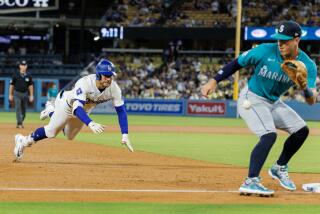Mariners Stood Pat During Off-Season
- Share via
SEATTLE — There are growing signs the 1985 season could be a pivotal one for the Seattle Mariners. Yet for the first time in the club’s eight-year history, the Mariners made no signficant off-season player deals.
The only activity of any kind at the major league level was the drafting of right-handed pitcher Mike Morgan, a one-time prospect who has been languishing in the Oakland and Toronto minor league organizations.
If a defending champion stands pat, that’s understandable. But this is a team that has averaged 97 losses per year, not counting the strike-shortened 1981 season. Last year, at 74-88, Seattle tied Chicago for fifth place in the AL West. In the entire 14-team league, only Milwaukee and Texas won fewer games.
Seattle’s inability to make any significant player deal is in sharp contrast to previous seasons when the club always had some new names--and often familiar ones--to parade in the spring.
Here’s a partial list of additions made by Seattle in previous years:
Gorman Thomas, Barry Bonnell, Bob Kearney, Jack Perconte, Dave Beard, Steve Henderson, Pat Putnam, Gaylord Perry, Al Cowens, Bill Caudill, Jim Essian, Todd Cruz, Bobby Brown, Richie Zisk, Jeff Burroughs, Jim Beattie, Juan Beniquez, Willie Horton, Floyd Bannister, Mario Mendoza, Bruce Bochte, Tom Paciorek, Shane Rawley and Craig Reynolds.
Given this history, why is the current management standing pat just when the club is making its biggest, and perhaps final, push to make baseball work in Seattle?
One obvious answer is the maturing of the club’s farm system. The arrival of Alvin Davis and Mark Langston--the league’s top rookie and rookie pitcher--in 1984 shows there is some young talent in the Mariner organization.
So instead of making yet another trade to fill the longstanding hole at third base, for instance, the club is willing to take a chance on Darnell Coles and Jim Presley.
“We think one of the problems the Mariners have had in the past is not having continuity,” said Chuck Armstrong, president of the club. “We have striven hard to maintain continuity and not trade away our stars. I’d rather go with Alvin Davis, Mark Langston, Jim Beattie, Spike Owen--what I think are going to be big names for us--as opposed to guys on the decline, which is what this franchise has done time and time again.
“So it wasn’t a conscious effort not to do any deals. We just didn’t find any we thought were worth doing.”
This the second season Armstrong and general manager Hal Keller have been running the Mariner organization.
Although it wasn’t all that obvious until the final month of the season, they believe the club made some significant strides last season. That means the club doesn’t have as many needs to fill.
“We haven’t felt forced to make changes,” said Keller. “I think our club last year was the best defensive club the Seattle Mariners have ever had. We had more team speed than our club ever had. It’s not like the days where we needed four base hits to score a run. In terms of home runs, last year’s club certainly compares favorably.
“I guess really what I’m saying is that last year we had many, many areas that needed improvement. We have gained a great deal of that.”
Beattie, a steady right-handed pitcher who came to the Mariners in November 1979 in a trade with the New York Yankees, has his own theory about why Seattle didn’t trade for any players this winter.
In brief, Beattie thinks the Mariners are good enough not to be desperate, but not good enough to be that proverbial one player away from a division title.
“I’m not sure the Mariners are at a searching stage,” he said. “With the young players we have, I don’t think you want to throw them away just because they aren’t quite ready.
“With the situation the Mariners have, we can see what goes on first. It’s not a real chancy thing, with the talent we have. There are some sure shots there (among the young players).”
All of this is not to say that the Mariners still won’t make some kind of deal this spring.
The club’s biggest need is for fifth starter. Beattie, Langston, Mike Moore and Matt Young combine to make up a very talented starting rotation, but the staff is generally young and Young and Beattie both have a history of injuries.
Potential trade bait could include one of the club’s veteran outfielders--such as Cowens or Bonnell--or second baseman Jack Perconte.
But Seattle’s experience this winter was that the price was never right.
Armstrong said, “We really found we place a greater perceived value on our players than the other teams.”
More to Read
Go beyond the scoreboard
Get the latest on L.A.'s teams in the daily Sports Report newsletter.
You may occasionally receive promotional content from the Los Angeles Times.










